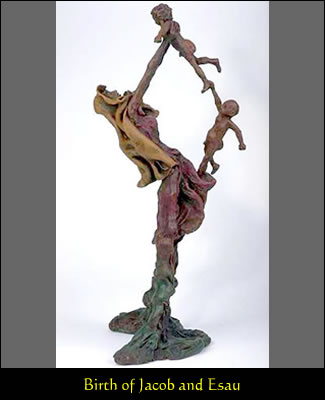 |
| Ratner Museum |
Commentary
From the BKC:
"So the book discusses the successions from his sons, following the custom of wrapping up the history of the unchosen line (Gen_36:1-43) before going to the chosen.""Second, Esau was Edom. In fact all through the chapter the reader is reminded of this. Certainly Israel would understand the import of this because she often struggled with the Edomites (cf. Obad.), Esau’s descendants." (Gen_36:43).
"In dramatic contrast with the expanding, powerful Esau, Jacob was dwelling in the land of the sojournings of his father… the land of Canaan. Unlike Esau, Jacob had no “chiefs” or kings (Gen_35:11) yet, no lands to govern, and no full tribes. He was a sojourner. Delitzsch pertinently remarked that secular, worldly greatness comes swifter than spiritual greatness (A New Commentary on Genesis, 2:238). A promised spiritual blessing demands patience and faith. Waiting while others prosper is a test of one’s faithfulness and perseverance." (Me--Worthwhile to think about.)
My Thoughts
I've had many thoughts about Jacob and Esau this time around, whereas in the past, I've gotten caught up in the bizarre superstitions that Jacob imposed upon the flock and the unfairness of Laban's dealings.
The narrative between the brothers is not as straightforward as I'd like....certainly full of the twists and turns of real life. The conflict starts in the womb, then is complicated by Rebekah's favoritism and Esau's disregard for his birthright. It leads Jacob to a life largely alienated from his homeland (ironically, as Rebekah loved that he hung around the tent and was a homebody in contrast to Esau) and alienated from the land promised to his grandfather.
When Jacob finally gets back to the land, the commentary above suggests Esau had prospered materialistically and like Lot, he was happy to choose/move to better land apart from his homeland. Esau didn't value his homeland nor did his ancestors.
Jacob was driven away from his home because of conflict. Years later, conflict and God's direction brought him back home again:
Jacob learned that Laban's sons were talking behind his back: "Jacob has used our father's wealth to make himself rich at our father's expense." At the same time, Jacob noticed that Laban had changed toward him. He wasn't treating him the same. That's when GOD said to Jacob, "Go back home where you were born. I'll go with you." -Genesis 31:1-3
Esau, who never left the homeland of his fathers, left it for greener pastures, and didn't look back. Jacob, left it for conflict, and came back to more conflict (i.e. Dinah and the repercussions of her rape).
Esau's future progeny (Edom) became a thorn in Israel's side. The Canaanites will become a constant source of temptation and conflict for the twelve tribes going forward.
What to make of it all? Lots! Mostly, I think it speaks of the complex interaction of the Lord's hand on our lives and the repercussions of our choices. All is not lost when we make mistakes, but the road will not be easy.

No comments:
Post a Comment